分子别名(Synonym)
CD80,B7,B7-1,B7.1,BB1,CD28LG,CD28LG1,LAB7
表达区间及表达系统(Source)
Biotinylated Human B7-1, Fc,Avitag (B71-H82F2) is expressed from human 293 cells (HEK293). It contains AA Val 35 - Asn 242 (Accession # NP_005182.1).
Predicted N-terminus: Val 35
Request for sequence
蛋白结构(Molecular Characterization)

This protein carries a human IgG1 Fc tag at the C-terminus, followed by an Avi tag (Avitag™).
The protein has a calculated MW of 52.3 kDa. The protein migrates as 65-95 kDa under reducing (R) condition, and 130-160 kDa under non-reducing (NR) condition (SDS-PAGE) due to glycosylation.
标记(Labeling)
Biotinylation of this product is performed using Avitag™ technology. Briefly, the single lysine residue in the Avitag is enzymatically labeled with biotin.
蛋白标记度(Protein Ratio)
Passed as determined by the HABA assay / binding ELISA.
内毒素(Endotoxin)
Less than 1.0 EU per μg by the LAL method.
纯度(Purity)
>95% as determined by SDS-PAGE.
制剂(Formulation)
Lyophilized from 0.22 μm filtered solution in Tris with Glycine, Arginine and NaCl, pH7.5 with trehalose as protectant.
Contact us for customized product form or formulation.
重构方法(Reconstitution)
Please see Certificate of Analysis for specific instructions.
For best performance, we strongly recommend you to follow the reconstitution protocol provided in the CoA.
存储(Storage)
For long term storage, the product should be stored at lyophilized state at -20°C or lower.
Please avoid repeated freeze-thaw cycles.
This product is stable after storage at:
- -20°C to -70°C for 12 months in lyophilized state;
- -70°C for 3 months under sterile conditions after reconstitution.
电泳(SDS-PAGE)
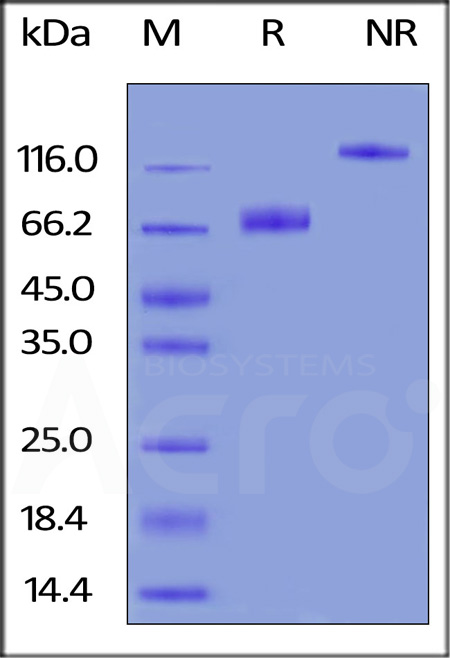
Biotinylated Human B7-1, Fc,Avitag on SDS-PAGE under reducing (R) and non-reducing (NR) conditions. The gel was stained with Coomassie Blue. The purity of the protein is greater than 95%.
SEC-MALS
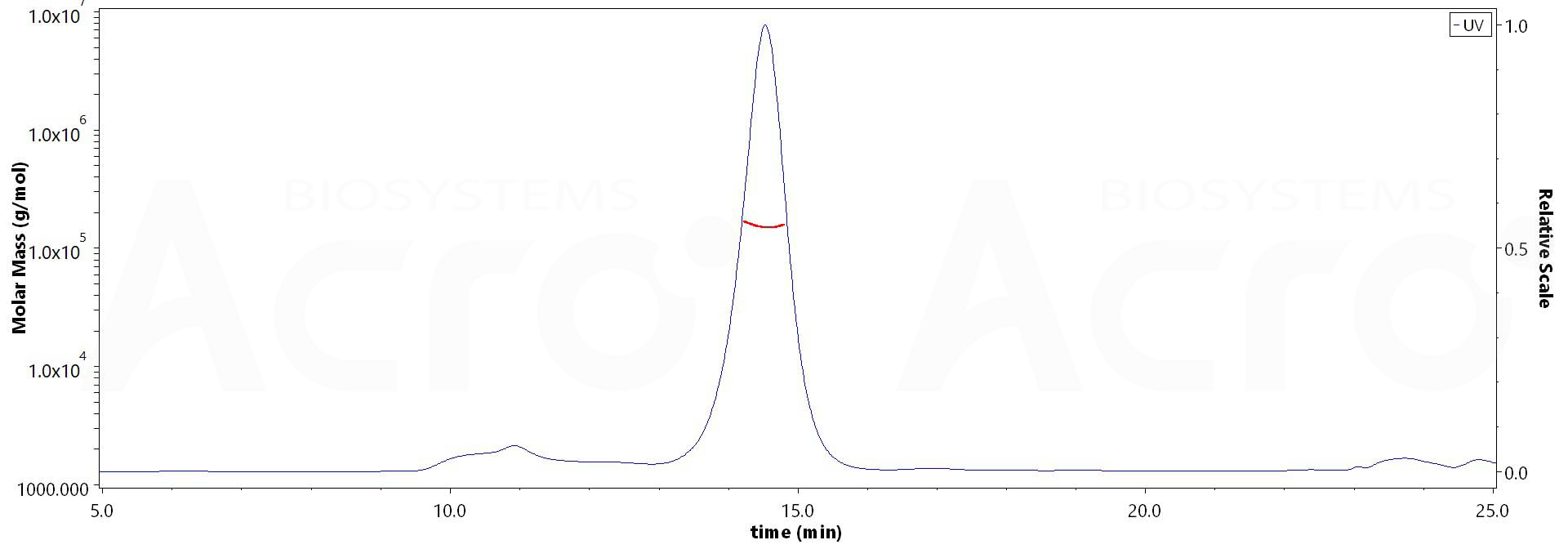
The purity of Biotinylated Human B7-1, Fc,Avitag (Cat. No. B71-H82F2) is more than 85% and the molecular weight of this protein is around 130-165 kDa verified by SEC-MALS.
Report
活性(Bioactivity)-ELISA
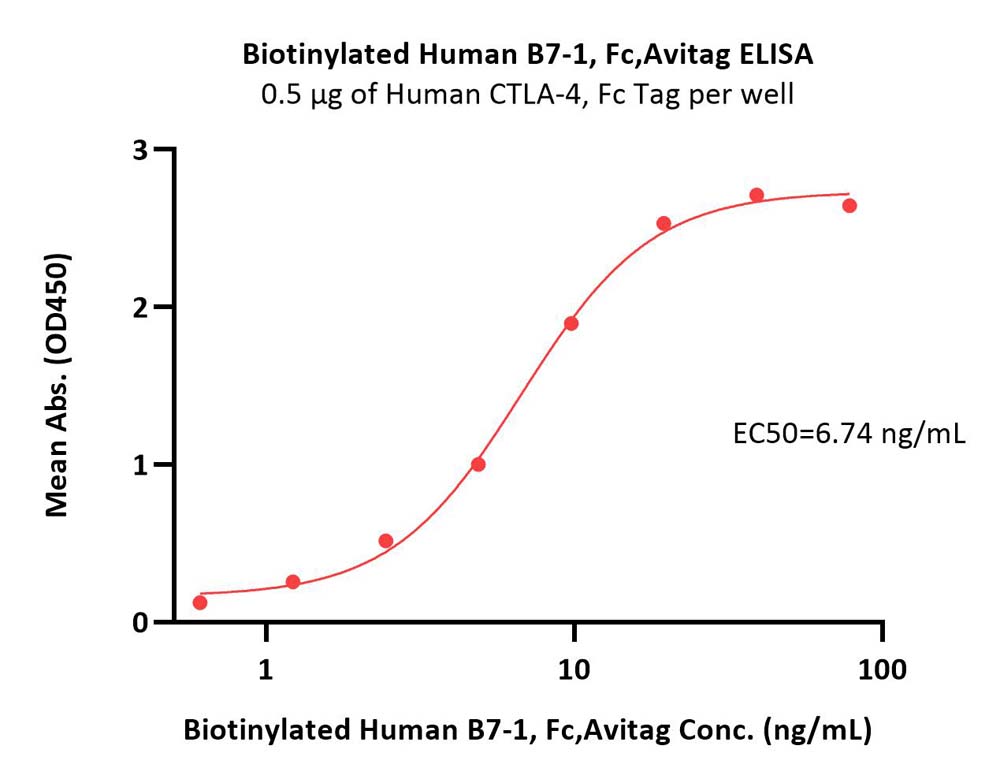
Immobilized Human CTLA-4, Fc Tag (Cat. No. CT4-H5255) at 5 μg/mL (100 μL/well) can bind Biotinylated Human B7-1, Fc,Avitag (Cat. No. B71-H82F2) with a linear range of 0.6-9.8 ng/mL (QC tested).
Protocol
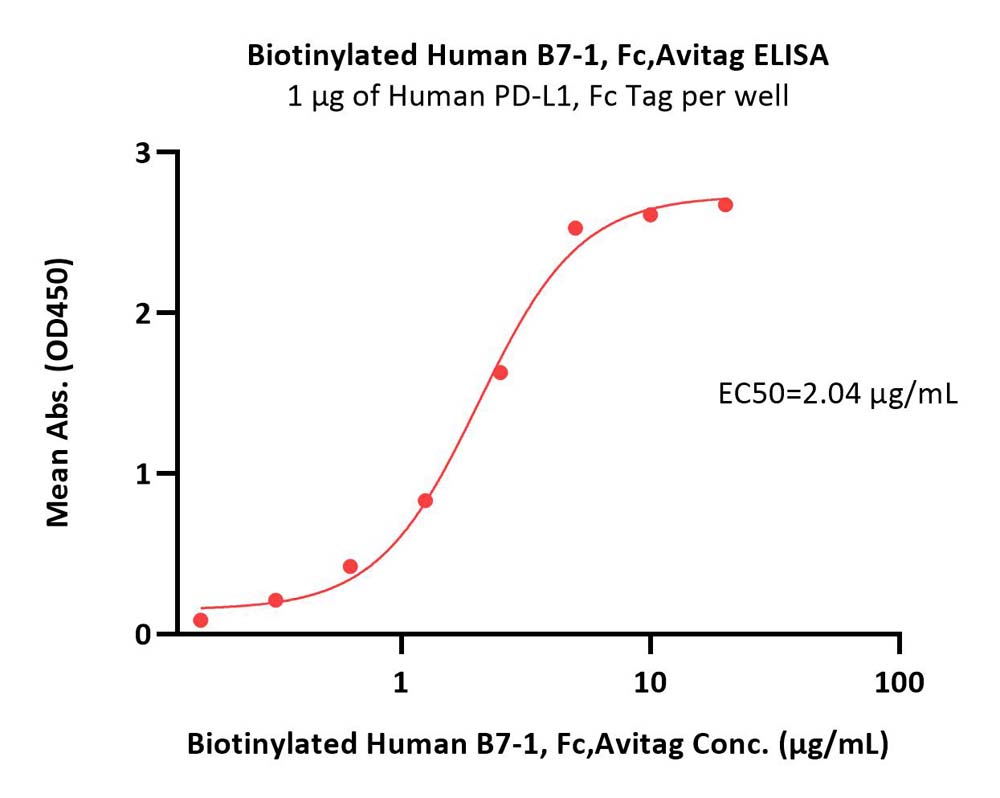
Immobilized Human PD-L1, Fc Tag (Cat. No. PD1-H5258) at 10 μg/mL (100 μL/well) can bind Biotinylated Human B7-1, Fc,Avitag (Cat. No. B71-H82F2) with a linear range of 0.156-5 μg/mL (Routinely tested).
Protocol
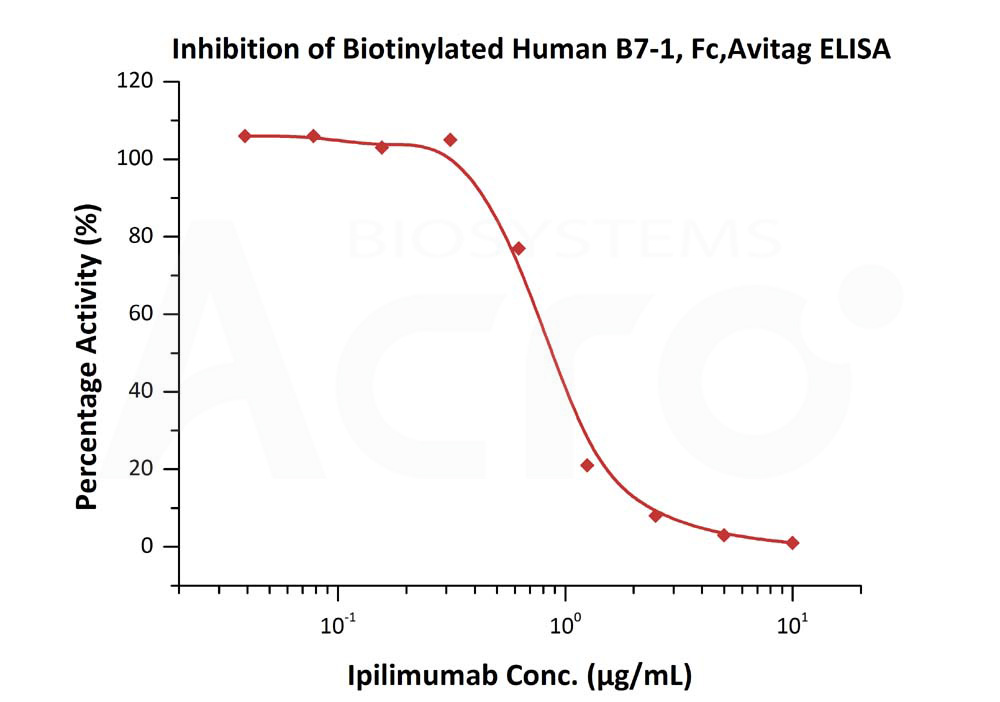
Serial dilutions of Ipilimumab were added into Human CTLA-4, Fc Tag (Cat. No. CT4-H5255): Biotinylated Human B7-1, Fc,Avitag (Cat. No. B71-H82F2) binding reactions. The half maximal inhibitory concentration (IC50) is 0.8260 μg/mL (Routinely tested).
Protocol
活性(Bioactivity)-FACS
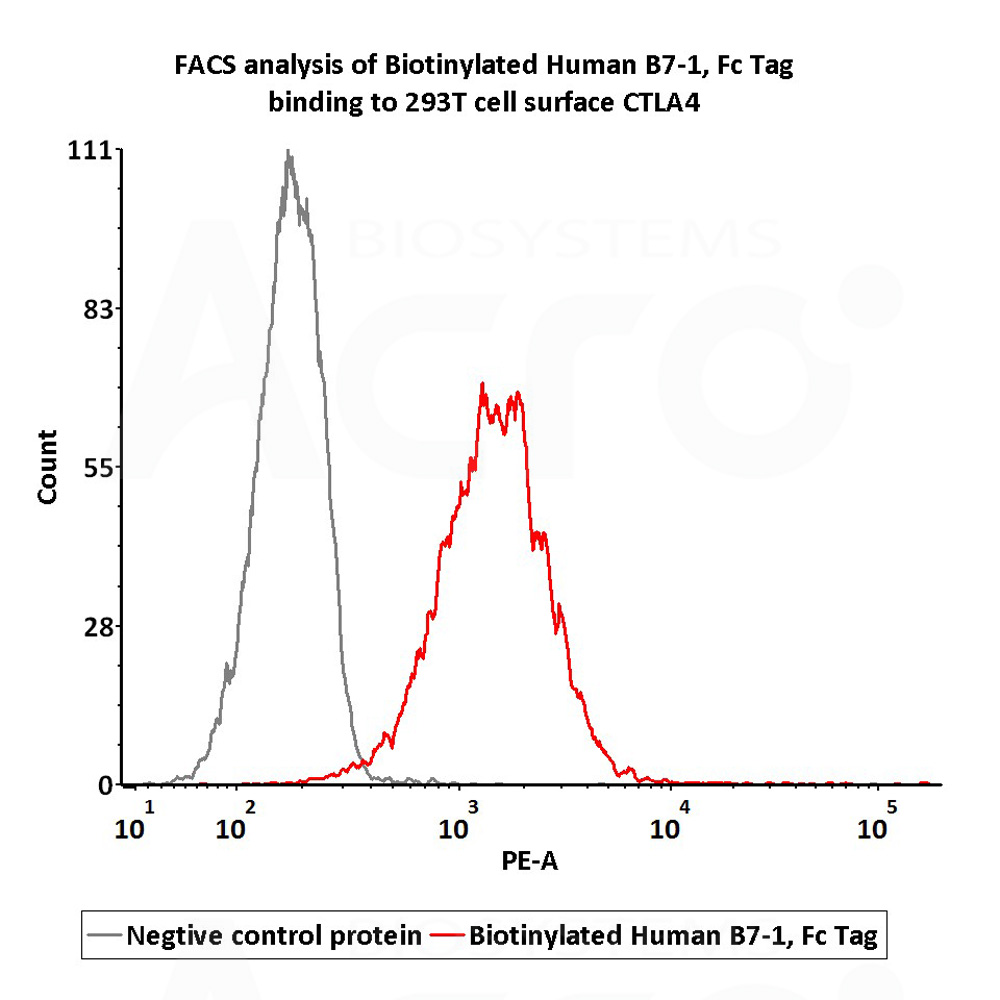
Flow Cytometry assay shows that Biotinylated Human B7-1, Fc,Avitag (Cat. No. B71-H82F2) can bind to 293 cell overexpressing human CTLA-4. The concentration of Human B7-1 is 0.3 μg/mL (Routinely tested).
Protocol
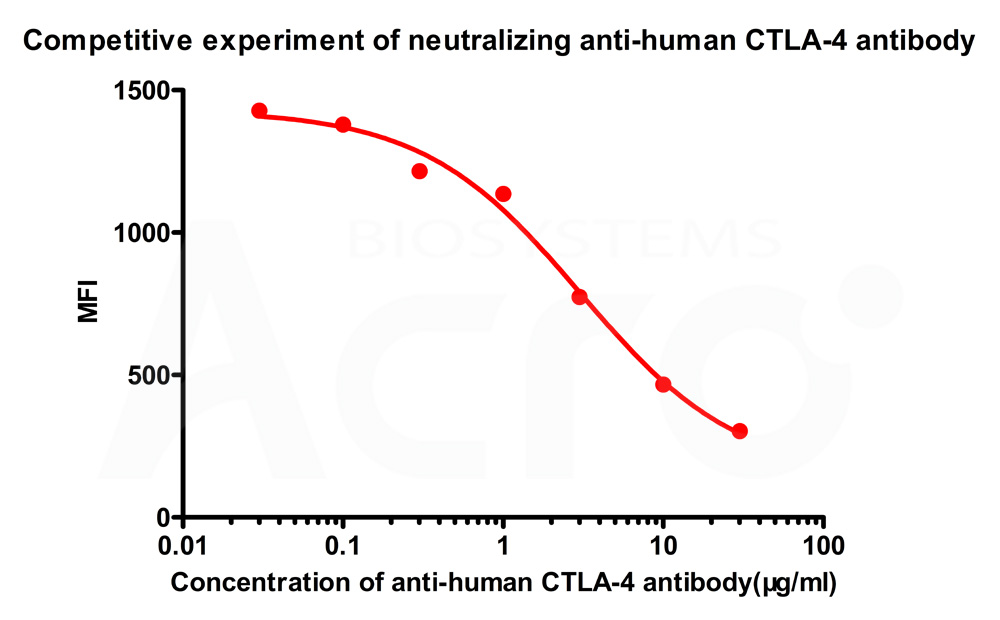
FACS analysis shows that the binding of Biotinylated Human B7-1, Fc,Avitag (Cat. No. B71-H82F2) to 293 overexpressing CTLA-4 was inhibited by increasing concentration of neutralizing Anti-Human CTLA-4 antibody. The concentration of B7-1 used is 0.3 μg/mL. The IC50 is 3.025 μg/mL (Routinely tested).
Protocol
背景(Background)
B7-1 and B7-2, together with their receptors CD28 and CTLA4, constitute one of the dominant co-stimulatory pathways that regulate T and Bcell responses. Although both CTLA4 and CD28 can bind to the same ligands, CTLA4 binds to B71 and B72 with a 20 100 fold higher affinity than CD28 and is involved in the downregulation of the immune response.
B-lymphocyte activation antigen B7-1 (referred to as B7) also known as cluster of Differentiation 80 (CD80), is a member of cell surface immunoglobulin superfamily and is expressed on activated B cells, activated T cells, macrophages and dendritic cells. It is the ligand for two different proteins on the T cell surface: CD28 (for autoregulation and intercellular association) and CTLA-4 (for attenuation of regulation and cellular disassociation). CD80 works in tandem with CD86 to prime T cells. CD80 plays a role in induction of innate immune responses by activating NF-κB-signaling pathway in macrophages. CD80 is thus regarded as promising therapeutic targets for autoimmune diseases and various carcinomas.























































 膜杰作
膜杰作 Star Staining
Star Staining












